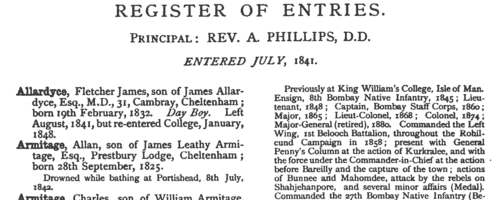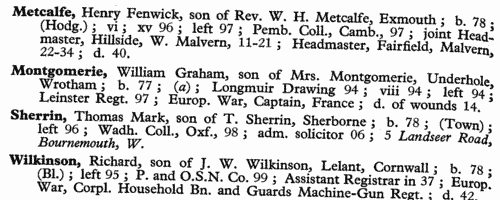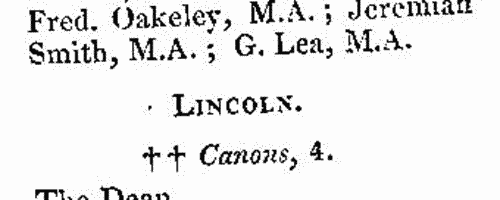Add this eBook to your basket to receive access to all 2,350 records. Our indexes include entries for the spelling newman. In the period you have requested, we have the following 2,350 records (displaying 1,281 to 1,290): These sample scans are from the original record. You will get scans of the full pages or articles where the surname you searched for has been found. Your web browser may prevent the sample windows from opening; in this case please change your browser settings to allow pop-up windows from this site. Bankrupts
(1841)
Bankruptcy notices for England and Wales: bankruptcy often caused people to restart their lives elsewhere, so these are an important source for lost links
| Sample scan, click to enlarge

| Bankrupts' Assignees
(1841)
Assignees of bankrupts' estates (usually principal creditors and/or close relatives of the bankrupt) in England and Wales | Sample scan, click to enlarge

| Boys entering Cheltenham College
(1841)
Cheltenham College 'was founded in order to provide for the sons of gentlemen a Classical, Mathematical, and General Education of the highest order, on moderate terms, in strict conformity with the principles and doctrines of the Church of England.'
Andrew Alexander Hunter, the college registrar, compiled the first edition of the College Register in four parts from 1883 to 1886: these merely listed the boys by term of entry, with their dates of birth and names and addresses of their fathers. Circulars were also sent out to all Old Cheltonians whose addresses were known, requesting additional details. On the basis of the returns from these and Hunter's further researches, this much fuller register was published in 1890.
The information after each boy's name is given (where known and applicable) in this format: father's full name and address as of the time the boy entered the college; class and department on entering the college (classes being number from 1 downwards, and these again divided into A and B, some into C and D, others into P (Principal's side) and V. P. (Vice-Principal's side) - 1A was the highest class in each department: besides this, certain others were called Addiscombe, Woolwich, Civil, Direct, Line, Sandhurst, Naval, Special, Preparatory, Latin, and India Civil) and the same on leaving, name of Boarding House (or 'Day Boy'), scholastic and athletic honours attained at the college, and subsequent career (including date and place of death, or present address in 1890, if known). | Sample scan, click to enlarge

| Boys entering Sherborne School
(1841)
The grammar school at Sherborne in Dorset, which doubtless existed from the creation of the diocese of Sherborne in 705, was refounded by king Edward VI in 1550. At the quatercentenary in 1950, a fourth edition of the Sherborne Register was published, listing boys entering the school during those four centuries. In truth, the materials for this register survive but fitfully before 1823; for some years, no names are known; sometimes all that is known is a surname. But from 1823 onwards the lists and the details get steadily more comprehensive. By the 20th century the boys are listed alphabetically by surname under term of entrance. Surname is given in bold, then christian names, name of father (surname and initials) and address; year of birth; house (a, School House; b, Abbey House; c, The Green; d, Harper House (formerly The Retreat); f, Abbeylands; g, Lyon House; h, Westcott House); whether represented the school at cricket (xi), football (xv), shooting (viii), &c.; year of leaving; summary of degrees, career &c.; and (in italics), address as of 1950. Names in the early lists marked with an asterisk are found inscribed on the oak panelling or on the stone walls of the former schoolroom. (F) in the lists indicates a foundationer, receiving free education: after 1827, when this privilege was restricted to boys from Sherborne and neighbourhood, nearly all foundationers were day-boys. | Sample scan, click to enlarge

| British diplomats abroad
(1841)
The Royal Kalendar lists her Majesty's ministers in Austria, Bavaria, Belgium, Brazil, Colombia, Denmark, France, the Germanic Confederation, Greece, Hanover, Mexico, Naples, Netherlands, Portugal, Prussia, Russia, Sardinia, Saxony, Spain, Sweden, Switzerland, Turkey, Tuscany, the United States of America, the United Provinces of the Rio de la Plata, Venezuela and Wurtemburg; and British consuls in Austria, Barbary, Belgium, the Brazils, Buenos Ayres, Central America, Chile, Denmark, Egypt, Ecuador, France, Frankfurt, New Granada, Greece, the Hanseatic Republic, Haiti, Mexico, Monte Video, the Netherlands, Palestine, Peru Bolivia, Poland, Portugal, Prussia, the Roman States, Russia, the Sandwich and Society Islands, Sardinia, Saxony, the Two Sicilies, Spain, Sweden and Norway, Syria, Turley, Tuscany, the United States of America and Venezuela. | Sample scan, click to enlarge

| Churchmen and church officers in England and Wales
(1841)
The Royal Kalendar has an extensive ecclesiastical section, giving the names of officials at the College of Doctors of (church) Law, the Ecclesiastical Courts, and the ecclesiastical law proctors; deans, chancellors, archdeacons, canons and prebendaries for all the dioceses of England and Wales; the officers and fellows (being all the parish priests within and without the walls of London) of Sion College; and the incumbents of the parishes within ten miles of London (annotated to show whether rectors, vicars or curates, and with the net annual revenue of each cure); the Ecclesiastical Commissioners for England; the Committee of Council on Education; and then the officers of the various religious societies (Queen Anne's Bounty Office, and First-Fruits and Tenths Offices; Commissioners for Building Additional Churches; Society for Promoting the Building of Churches and Chapels; Anniversary Festival of the Sons of the Clergy; Society for Promoting Christian Knowledge; Society for the Propagation of the Gospel in Foreign Parts; Dissenters' Library; Society for Maintaining and Educating Poor Orphans of Clergymen of the Established Church; Society for Promoting Religious Knowledge; Patrons of the Anniversary of the Charity Schools; Naval and Military Bible Society; Society for the Support and Encouragement of Sunday Schools throughout the British Dominions; Society for Extending the Christian Faith in the British West India Islands; London Missionary Society; Religious Tract Society; Society for the Suppression of Vice; British and Foreign Bible Society; Church Missionary Society; Prayer Book and Homily Society; Dr Bray's Institution; London Society for Promoting Christianity among the Jews; National Society for the Education of the Poor in the Principles of the Established Church; Church Pastoral Aid Society; European Missionary Society; British Society for Promoting the Religious Principles of the Reformation; and the Protestant Association). | Sample scan, click to enlarge

| County Cork Freeholders: Booth No 1
(1841)
The poll books of voters in the parliamentary election for county Cork 13 to 15 July 1841 delivered in to the select committee that subsequently looked into the propriety of the proceedings, and then annotated with observations as to those votes to which objection had been raised. There are separate books for seven booths, with the electors' names in order of voting: giving each freeholder's full name, place of abode, situation of the freehold, value, number and date in the alphabetical registry book, and for which candidates they voted (Daniel O'Connell, Edmund Burke Roche, Nicholas Philpot Leader, and Robert Longfield). The seven booths are for these areas: 1. Duhallow barony; 2. Hall County Side, East East Carbery, West East Carbery and East West Carbery; 3. Barrymore and West West Carbery; 4. Condons and Fermoy; 5. Imokelly and West Muskerry. | Sample scan, click to enlarge

| Dissolutions of Partnerships
(1841)
Trade partnerships dissolved, or the removal of one partner from a partnership of several traders, in England and Wales
| Sample scan, click to enlarge

| Dividends of bankrupts' estates
(1841)
Dividends from moneys raised from bankrupts' estates in England and Wales | Sample scan, click to enlarge

| Freemen of the city of Oxford
(1841)
A parliamentary poll of the freemen and electors of the City of Oxford was taken 30 June 1841, the candidates being Donald Maclean (Mac), James Haughton Langston (Lan) and Neill Malcolm (Mal). The poll book records the names, addresses and occupations of the householders, district by district, as well as the names of the freemen of the city, and shows for whom they voted. | Sample scan, click to enlarge

|
Research your ancestry, family history, genealogy and one-name study by direct access to original records and archives indexed by surname.
|











